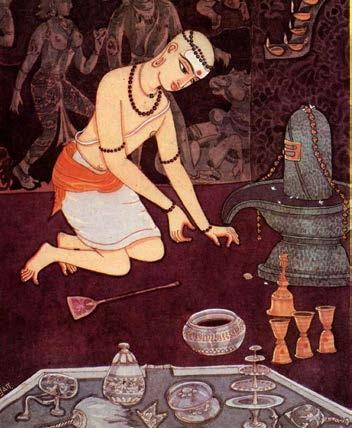Appar Nāyaṉār
Jealous enemies plotted to destroy Appar, first by throwing him into a hot lime kiln where for seven days he was spared from harm by the burning flames. Next, a fierce warrior-elephant was set upon him but upon hearing Appar’s sweet songs, the wild beast became tame and gentle and humbly prostrated before him. Finally the saint was thrown into the ocean tied to a large millstone. But by the Lord’s intercession, the stone only floated, serving as a boat to lead the saint to safety.
Appar befriended Jnanasambandar and sang the Lord’s glory in every corner of the land. At long last he made the great yatra to Kailash where he strived to ascend the Lord’s abode even until the flesh of his bare feet was worn to the bone. He crawled until the flesh of his hands was torn away. So determined he was, he continued to climb on his belly. Meanwhile the Lord, having compassion on him, appeared before him disguised as a sage and sought to persuade him to give up his quest. But Appar’s resolution was unshakable. Finally the Lord revealed Himself to him in all His Glory, blessed him and restored his wounded body. In an instant Appar found himself healthy and strong and miraculously transported back to the Tamiḷ land, where once again he continued his pilgrimage, singing the glory of the Lord with even greater zeal.
One day amidst the throng that surrounded Jnanasambandar, the aged Appar went unperceived and made himself one of the bearers of Sambandar’s palanquin. In the precincts of Thiruppoonthurutthi, Sambandar enquired gently: “Where is Appar?” Hearing this, Appar melted with love and answered: “I, your servant, blessed to bear your gracious feet on his shoulders, am here below”. When these words fell into his ear, Sambandar rushed down with palpitating heart, tried to pay obeisance to the aged saint, who however, anticipated this with his own adoration. To behold the two saints locked in embrace was indeed a blessed sight.
Reproduced from the December 2012 issue of the Saranāgatī eNewsletter
published by Sri Ramanasramam. The above text has been freely adapted from editions
of Periapurāṇam, Siva Bhakta Vilāsam (published by Sri Ramanasramam) and other texts.

